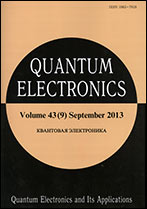|
Integrated-optical Bragg modulator with variable-period inclined electrodes
I. M. Akhmedzhanov, E. M. Zolotov, A. M. Prokhorov, E. A. Shcherbakov
Abstract:
An investigation was made of an integrated-optical Bragg modulator based on a Ti-diffused waveguide in LiNbO3 with electrodes characterized by a linearly varying spatial frequency and a variable inclination, designed to focus light in the waveguide plane. The focal length of the modulator was F = 38 mm, the half-wave voltage was Uλ/2 = 7.5 V, and the width of the pass band was Δf = 430 MHz.
Received: 02.06.1983
Citation:
I. M. Akhmedzhanov, E. M. Zolotov, A. M. Prokhorov, E. A. Shcherbakov, “Integrated-optical Bragg modulator with variable-period inclined electrodes”, Kvantovaya Elektronika, 11:4 (1984), 744–747 [Sov J Quantum Electron, 14:4 (1984), 503–505]
Linking options:
https://www.mathnet.ru/eng/qe5019 https://www.mathnet.ru/eng/qe/v11/i4/p744
|


|





 Contact us:
Contact us: Terms of Use
Terms of Use
 Registration to the website
Registration to the website Logotypes
Logotypes








